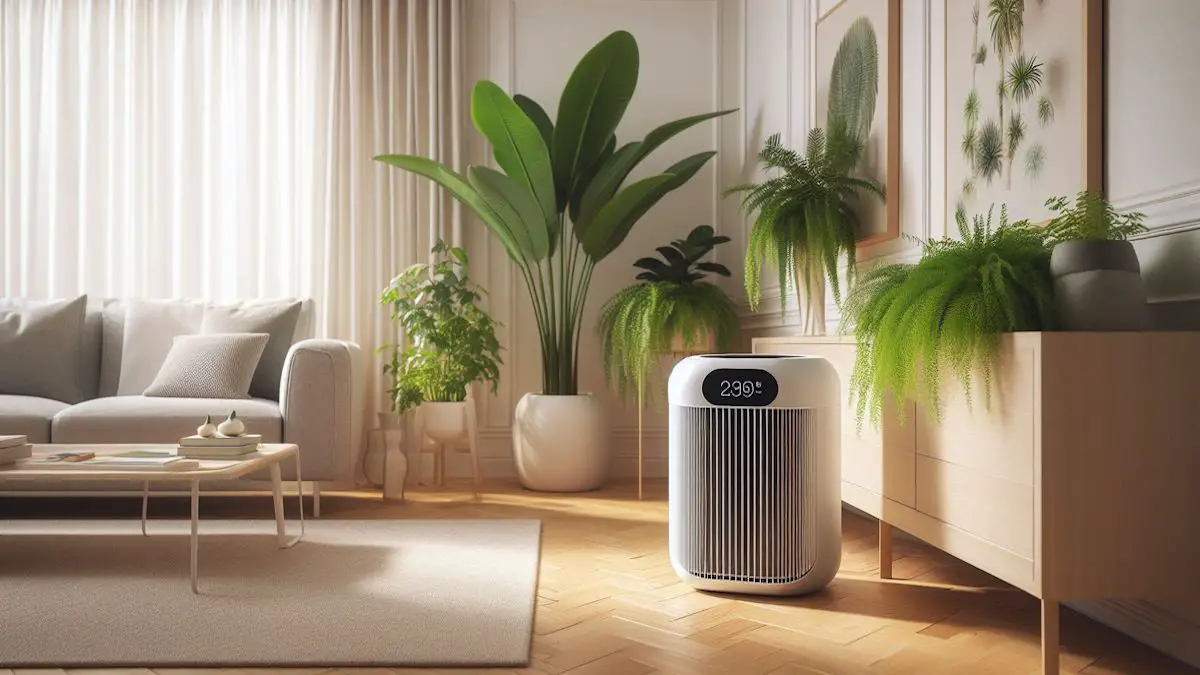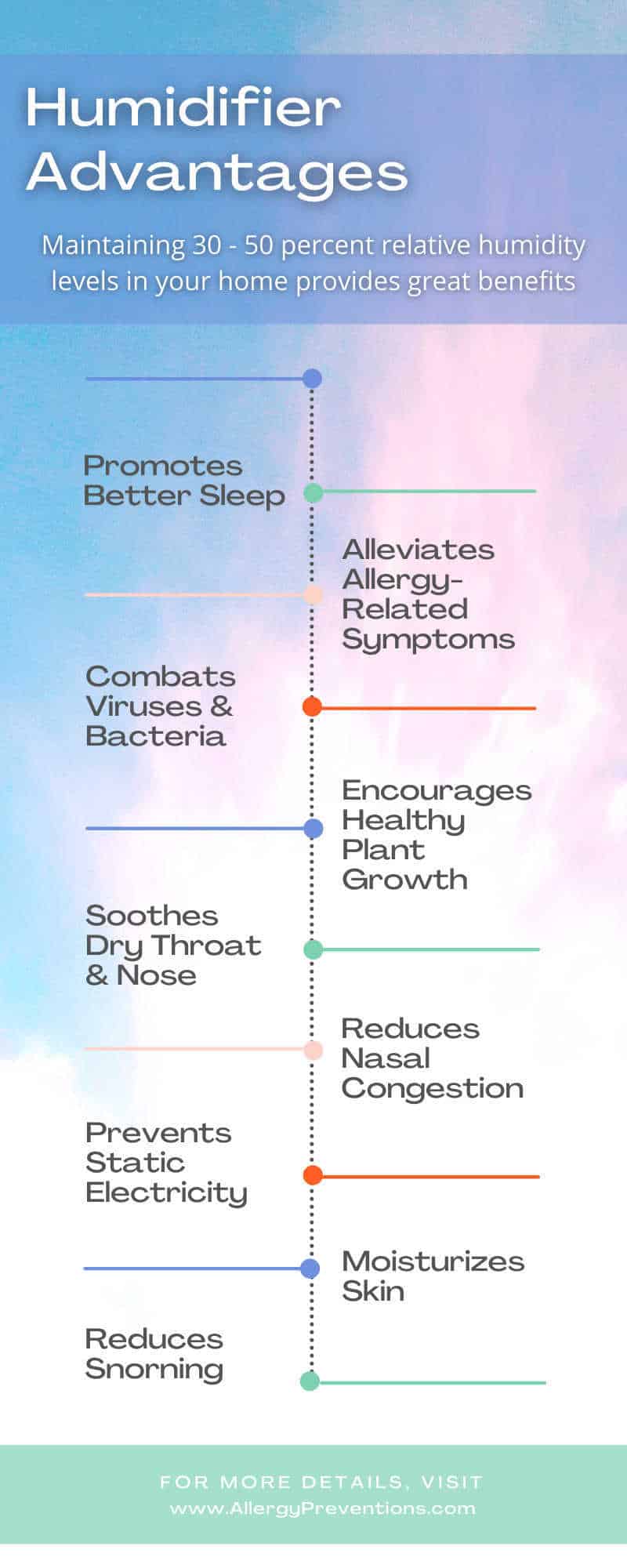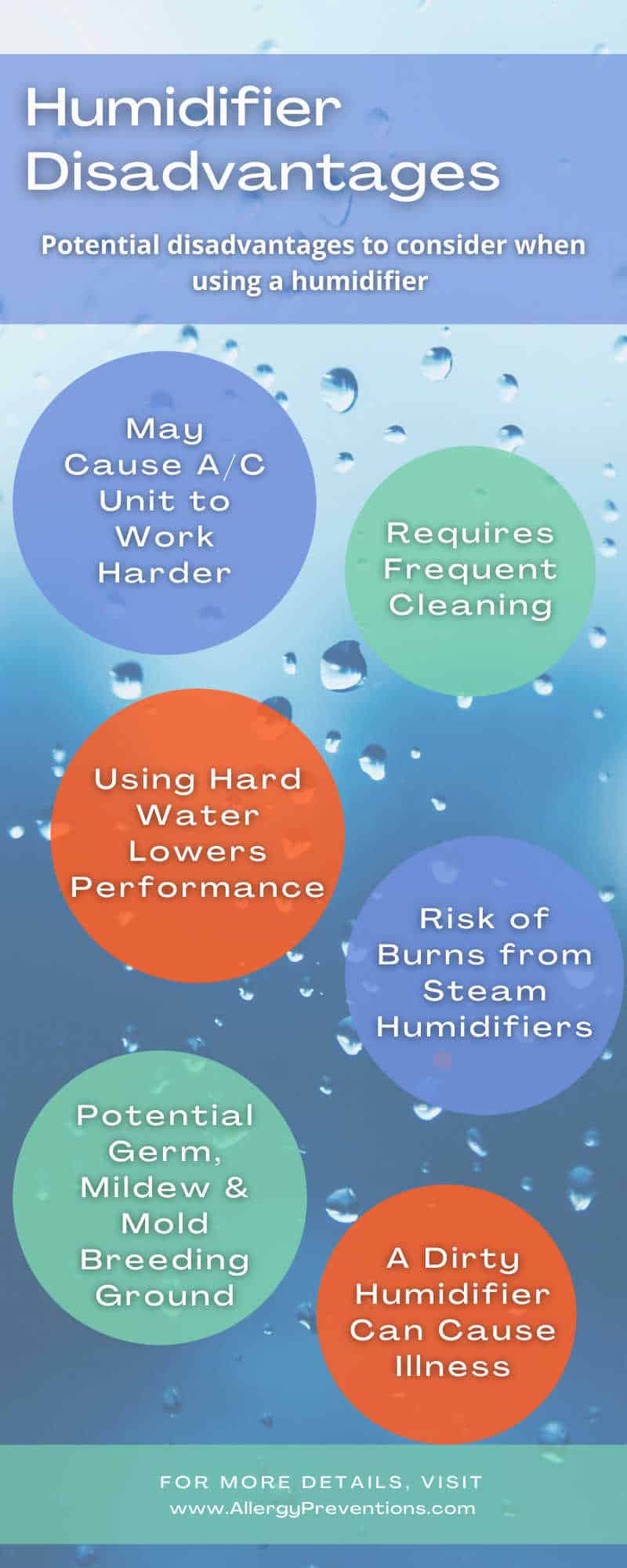So, you are asking yourself, “Should I use a humidifier in summer?” Most of us have experienced cold and dry winters, so we get out the humidifier to help make those dry nights more comfortable. In the summer when the air conditioning is running non-stop, our skin is getting dry, our nose is congested, and our plants are sad.
You can use a humidifier in summer but there are advantages, disadvantages, and important tidbits to consider.

As an Amazon Associate, I earn from qualifying purchases.
Table of Contents
Advantages of Using A Humidifier in Summer

Humidifiers can turn an uncomfortably dry room into a nice cozy place to live comfortably. They work by putting moisture back into the air we breathe. Here is a list of the advantages of using a humidifier in summer:
- Promotes better sleep
- Reduces snoring
- Combats viruses & bacteria
- Moisturizes skin
- Soothes dry throat & nose
- Reduces nasal congestion
- Prevents static electricity
- Encourages healthy plant growth
- Alleviates allergy-related symptoms
Something important to note is you need to maintain relative humidity levels in the range of 30 percent to 50 percent to avoid excess humidity issues.
Potential Disadvantages of Using A Humidifier in Summer

There are important potential disadvantages to be aware of when using a humidifier, but most are avoidable! The main concern that causes most of these disadvantages is humidity levels that are too high, which is above 60% humidity. Here is a list of other potential disadvantages to consider:
- Humidity may cause the A/C unit to work harder
- Requires frequent cleaning
- Using hard water lowers performance/product life expectancy
- A steam humidifier can become a burn risk
- Potential breeding ground for germs, mildew, and mold
- A dirty humidifier can cause illness
Disadvantages of Too Much Humidity Indoors

Generally speaking, too much humidity inside your home (above 60% humidity) leads to some potential drawbacks as well. Here is a list of disadvantages of too much humidity indoors:
- Damp items in the home
- Moisture buildup on windows
- Breeding ground for dust mites
- Attracts moisture-loving insects
- Promotes mold & mildew growth
- Can make asthma symptoms worse
Don’t let these potential disadvantages deter you! As long as you use distilled water, keep humidity levels below 60%, and clean the humidifier often, you can prevent most of these “cons”.
How To Measure Humidity Levels Accurately in Your Home

Your humidifier might be equipped with a means to measure the humidity levels, but these built-in features tend not to be very accurate.
To get an accurate humidity measurement I recommend getting a Hygrometer. A hygrometer is simply an instrument that measures humidity levels. Amazon has a large variety and you can pick up a very decently rated hygrometer for under $15.
Can You Use a Humidifier With an Air Conditioner?

Yes, you can use a humidifier with an air conditioner. Air conditioning units cool the air and remove moisture, and When humidity levels drop, you may begin to notice more than just dry air.
You might notice that your skin is dry and itchy and you might have an increase in nose bleeds, due to the dry air caused by the air conditioning unit.
As long as you maintain home humidity levels lower than 60%, and over 30% you will relieve symptoms, without causing complications from too much humidity.
How long can you run a humidifier?

You should run a humidifier long enough to achieve the ideal relative humidity (RH) levels of 30%-50%. The EPA recommends that relative Humidity should be kept below 60 percent to prevent mold growth.
Of course, review your humidifier’s instructions to ensure that you are also operating within the company’s operation guidelines.
Can you run your humidifier all night?

You can run your humidifier all day and night unless the manufacturer says otherwise. You will need to ensure that you are keeping the humidity levels under control and cleaning the humidifier per the unit’s instruction manual.
Should you use a humidifier if you have asthma?

Depending on your triggers, a humidifier might make allergies and asthma symptoms worse. The Asthma Society of Canada DOES NOT recommend a humidifier or vaporizer for the management of asthma. But, they do mention that using a humidifier may assist with relieving dry skin, nose, throat, and lips.
Overall, you should get a doctor’s approval before introducing a humidifier if you suffer from asthma.
Recommended Humidifier Features

When selecting a humidifier, consider these recommended features for optimal performance and convenience:
- Adjustable Humidity Levels: Look for a humidifier with adjustable settings to control humidity levels according to your preference and the environment.
- Cool Mist: Cool mist is often recommended for safety, especially in households with children or pets.
- Easy-to-Clean Design: Opt for a humidifier with accessible parts for easy cleaning and maintenance.
- Quiet Operation: Look for a humidifier with quiet operation, especially if you plan to use it in bedrooms or other quiet spaces.
- Large Water Tank Capacity: Choose a humidifier with a larger water tank capacity to ensure longer run times and fewer refills, especially for larger rooms.
- Timer and Auto Shut-Off: Features like a timer and auto shut-off function allow you to set the humidifier to operate for a specific duration and ensure safety by turning off when the water tank is empty.
- Filter Options: Consider whether you prefer a humidifier with a filter or a filter-free design. Filters can help trap impurities and minerals in the water, while filter-free models may require more frequent cleaning.
- Ultrasonic Technology: Humidifiers with ultrasonic technology produce a fine mist quietly and efficiently, making them ideal for use in bedrooms and nurseries.
- Aromatherapy Compatibility: Some humidifiers offer compatibility with essential oils or fragrance pads, allowing you to enjoy aromatherapy benefits along with humidification.
If I were asked what humidifier I recommend it would be the Levoit Smart Humidifier. It has all the recommended features and is a “smart” humidifier, so I can control it from my phone. Additionally, the price is right, and the ratings are awesome.
Final Thoughts
Running a humidifier in the summer can be beneficial to your health, and create a soothing environment inside your home. Don’t forget to keep humidity levels under control with a hygrometer, and properly clean your machine regularly.
Check these articles out:
